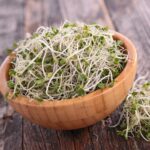Amidst the era of information proliferation and heightened health-consciousness, there has been a remarkable upsurge in the demand for organic vegetables and fruits. People today exhibit a heightened awareness of the advantages associated with the consumption of organic produce, free from the deleterious effects of pesticides and synthetic chemicals. In this extensive exposition, we shall delve comprehensively into the realm of organic vegetables and fruits, gaining an understanding of their profound significance and acquiring valuable insights on seamlessly integrating them into your daily dietary regimen.
Comprehending the Significance of Organic Harvests
Organic vegetables and fruits are nurtured through natural methodologies, which eschew the use of synthetic pesticides, herbicides, and genetically engineered organisms. This culminates in produce that is not only safer for consumption but also demonstrates an unwavering commitment to environmental sustainability. Herein, we elucidate the pivotal reasons why embracing the organic path is a judicious choice:
1. Pestilence-Free Wholesomeness
A paramount rationale driving individuals towards organic produce lies in the conspicuous absence of synthetic pesticides. Conventional agriculture often resorts to these chemical agents to shield crops from pests, albeit leaving behind pernicious residues on the harvested yield. In contrast, organic farming relies on nature’s arsenal, employing techniques such as crop rotation and the introduction of beneficial insects, thereby ensuring the attainment of pristine, healthier produce.
2. Nutrient-Enriched Abundance
Organic vegetables and fruits are celebrated for their enhanced nutritional content. The absence of synthetic chemicals in the soil facilitates a more efficient nutrient uptake by plants, thereby bestowing upon the harvest a profusion of vitamins, minerals, and antioxidants. This not only augments the nutritional value but also tantalizingly elevates the flavor profile of the produce.
3. Environmental Stewardship
The choice to embrace organics transcends individual health benefits; it extends to the well-being of our planet. Organic farming methodologies are underpinned by a fervent commitment to soil vitality, pollution mitigation, and the fostering of biodiversity. By lending support to organic agriculture, we actively contribute to the cultivation of a more sustainable and ecologically harmonious world.
Assimilating Organic Produce into Your Culinary Repertoire
Now that we have garnered a profound appreciation for organic vegetables and fruits, let us embark on a journey to seamlessly incorporate these nutritional gems into your daily dietary regimen.
1. Prudent Procurement
Commence by seeking out the nearest farmers’ markets or purveyors of organic sustenance. These locales typically offer a cornucopia of fresh, organic produce. During your procurement, be vigilant for the USDA Organic seal, a hallmark that guarantees adherence to rigorous organic standards.
2. Seasonal Diversification
Celebrate the cyclical bounty of nature by embracing seasonal offerings. Seasonal fruits and vegetables not only proffer heightened flavors but also present an economically astute choice.
3. Homestead Cultivation
For individuals endowed with a green thumb, the prospect of cultivating organic vegetables and fruits in the sanctuary of your own abode may be alluring. This endeavor grants you unbridled control over the cultivation process, ensuring the procurement of the freshest produce conceivable.
4. Gastronomic Exploration
Embark on a culinary odyssey, experimenting with organic recipes that allow you to relish the delectable essence of your organic produce. From vibrant salads to hearty soups, the spectrum of possibilities when incorporating organic ingredients into your culinary creations is virtually boundless.
Dispelling Common Misconceptions
Let us now address and dispel some common myths that often shroud the realm of organic produce:





